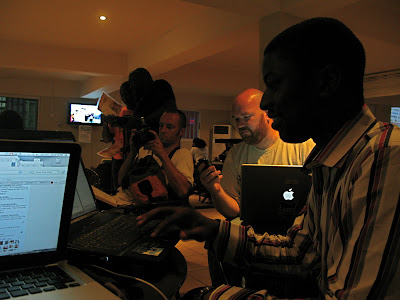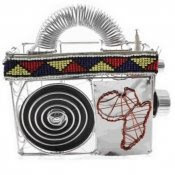> Yesterday, at out monthly meet-up we had visitors from Maker Faire Africa, Maneno and some probloggers like WhiteAfrican. All in all about 20 people joined in at Smoothies in Osu.
Yesterday, at out monthly meet-up we had visitors from Maker Faire Africa, Maneno and some probloggers like WhiteAfrican. All in all about 20 people joined in at Smoothies in Osu.
We learned about Maker Faire Africa which is an initiative to boost African inventions, upscale them or just spread their usability from country to country. They have set up camp at the Kofi Annan IT Center in Accra for the weekend and I’ll be heading over there in a bit.
Also Miquel from the African-inspired blogging platform Maneno (meaning ”words” in Kiswahili) told us about how he came up with the idea after visiting the Kongo where internet is slow and expensive. Maneno is tailored for the subsaharan conditions and seek to invite more Africans to become bloggers. He posed some interesting questions to us.
Internet is quite reliable and not too expensive in Ghana. So would SMS posting be interesting here?
Discussion followed where most ghanablogging members seemed to think mobile solutions could catch on in Ghana. Also Internet – even if available – is largely restricted to the elite in Accra.
Miquel also asked:
What do bloggers in Ghana write about?
We had difficulties summarizing the rich and varied blogosphere in Ghana, but compared to the very different Nigerian blogosphere where blogs serve a more political purpose. IN Ghana we mentioned blogs about lifestyle, current affairs and poetry, but there are many other subjects. Coming up soon on ghanablogging.com will be listing blogs in “categories”, maybe that will help?
Finally, problogger Eric/WhiteAfrican/Afri Gadget talked about blogging as a job. Eric grew up in Kenya and Sudan and studied in the US. He told us how blogging started as a hobby, just like for most of us, and grew, grew and grew. He stressed producing your own content rather than just writing about others work or reposting it. A blog with new content, could be the only place to go for certain type of information! He writes about technology in Africa and when starting the AfriGadget site recently it quickly surpassed his popular personal blog, WhiteAfrican.
Not anybody can be a blogger, he said. You have to be consistent. After 6 months you have to keep posting, your readers will expect it.
Present were Ghanablogging members David Ajao, Samson Ojo, Toke Olagbaju, Nana Kofi Acquah, Nana Yaw Asiedu, Cornelis Rouloph Otoo, Edward Amartey Tagoe , Gameli Adzaho and Emmanuel K. Bensah jr.
and not yet members, but hopefully soon, Nii Ayertey Aryeh and Lora Akati.
Some of the interesting guests were Miquel Hudin of Maneno, Erik Hersman (WhiteAfrican and AfriGadget), Klaas Kuitenbrouwer, William Kamkwamba (lead name at MFA), ‘Tosh’ Hamilton Juma, Nigerian entertainment blogger Chika Okafor and Brian Shih.
And me.
It was the biggest number of bloggers so far convened in Ghana! Thanks to everybody for coming and maybe we should try to invite guests a bit more often?
In the pic: David Ajao, Eric Hersman and Klaas Kuitenbrouwer being nerdy.
 In the BBC production An African Journey with Jonathan Dimbleby, the story about Africans returning back to their continent is unveiled, according to a recent BBC article.
In the BBC production An African Journey with Jonathan Dimbleby, the story about Africans returning back to their continent is unveiled, according to a recent BBC article.





